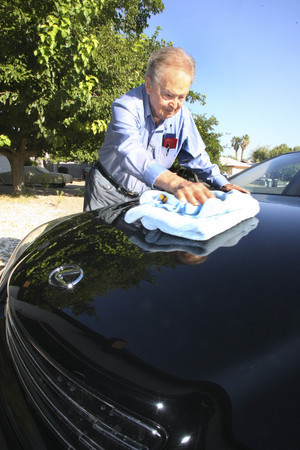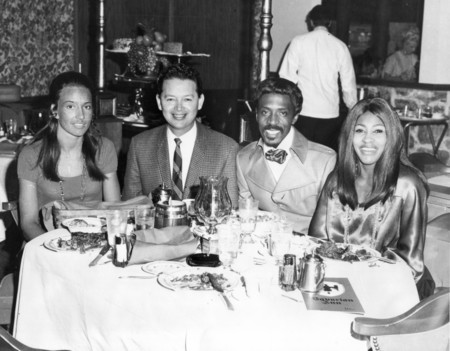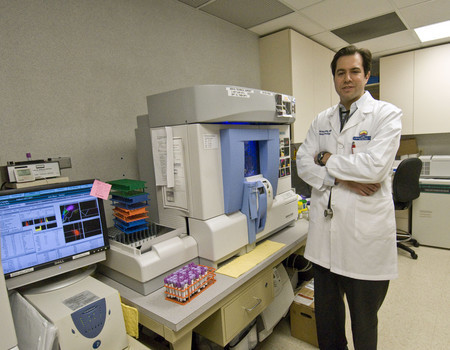Cancer fighter enjoying new life
There was a time in Bill Layne's life when his biggest concern was making sure that the performance contracts of Elvis Presley, Ike and Tina Turner, Barbra Streisand, Nancy Sinatra, Perry Como and many other entertainers were in order at either the International or Las Vegas Hilton hotels.
His entertainment administrator position at the International, which was renamed the Las Vegas Hilton in 1971, also called for him to help keep the entertainers and their family and friends comfortable.
"It was my challenge to keep people happy," the 84-year-old retiree said last week as he sat in his east Las Vegas home and looked at photographs of entertainers he worked with more than 30 years ago.
Now his challenge is "just a bit more serious."
"I want to stay cancer-free," he said. "I need time to get a friend a recording contract."
It now appears, largely because of his participation in a unique national cancer trial, that he'll have the time to pitch the merits of a California singer and composer named Kyle to recording companies.
"Listen to the lyrics," Layne said as he turned on a CD player. "I hope I can get him a contract. I know it's a long shot, because I'm not sure I have any of the right connections any more."
The Navy veteran did have the right connections to keep himself alive.
Two years ago, his primary care physician at a Las Vegas VA clinic, Dr. Stephen Billmyer, ordered tests that revealed a weakened Layne had cancer in his esophagus, the tube that carries food from the mouth to the stomach.
Layne, who was suffering from internal bleeding, was referred to Dr. Gregory Obara, an oncologist at Comprehensive Care Centers of Nevada.
"Esophageal cancer is one of the deadliest cancers," Obara said last week. "The results of treatments are usually quite poor, because it's not diagnosed in the early stages."
Standard chemotherapy and radiation treatments didn't help Layne, whose real name is Seymour Lifschin.
"I used Bill Layne professionally because Seymour Lifschin didn't sound like show business," Layne explained. "Most people in Las Vegas know me as Bill Layne."
No matter what name Obara's patient went by, it didn't appear he was much longer for this world. He could barely walk. He wanted to sleep all the time. He didn't want to eat, dropping 40 pounds.
But then, with all regular treatments for his patient exhausted, Obara recalled that a colleague, Dr. Matthew Galsky, was the principal investigator in a national clinical trial. The trial was investigating whether Lapatinib, a drug used to treat HER2-positive breast cancer, could work on cancers found in other parts of the body.
This form of breast cancer tests positive for a protein called human epidermal growth factor receptor-2, or HER2, which promotes cancer cell growth.
In about one of every three breast cancers, cancer cells make an excess of HER2 because of a patient's gene mutation. The mutation can occur in many types of cancer, though it's most common in breast cancer.
It turned out Layne's tumor had the HER2 protein that Lapatinib targets well in breast cancer.
A little more than a year ago, Layne became part of a trial with 31 other people who seemed to have an excess of the HER2 protein. Patients with bladder, ovarian and uterine tumors were also treated with Lapatinib.
"I was taking six huge pills a day for a year," said Layne, who also had a precancerous lesion removed from his esophagus at UCLA.
He stopped the drug regimen this summer.
"He no longer has cancer," Obara said. "He's doing excellent now."
Now you see Layne walking through his neighborhood and polishing his Lexus before he takes it for a spin. His weight's back up, and he's dating again.
"I never did get married," he said. "When I came to Las Vegas, I promised my father I wouldn't gamble."
Galsky, who came to Las Vegas two years ago from the renowned Sloan-Kettering Cancer Center in New York, said Layne is the only one in the trial to realize such success.
A few others saw their cancers stabilize, Galsky said.
What investigators have learned is "that we're probably not as smart as we think we are."
It can't be the HER2 protein alone that was driving the cancer growth in the other 31 patients, he said.
Still, Galsky said, it appears from Layne's success that a drug targeted to work on a specific abnormality can work, no matter where the cancer started.
"Why it was unsuccessful in other patients is not clear and requires further investigation," Galsky said. "There might be something in his (Layne's) tumor that is similar to those with breast cancer that makes him so sensitive to this drug."
A study soon to begin will look at two different protein abnormalities that investigators hope to target with a drug similar to Lapatinib.
"We want to get a more personalized medical treatment for patients than just a one size fits all," Galsky said.
He terms what has been learned from Layne's case as a "baby step" in the fight against cancer.
"And when you get a series of baby steps, you really have something," he added.
Layne doesn't want to hear about baby steps right now.
On Wednesday, with CDs in hand, Layne jumped in his Lexus for a drive to California. He planned on "bending the ears" of some record producers. "I want to get that record contract for Kyle before I die."
Contact reporter Paul Harasim at pharasim@reviewjournal.com or 702-387-2908.



















